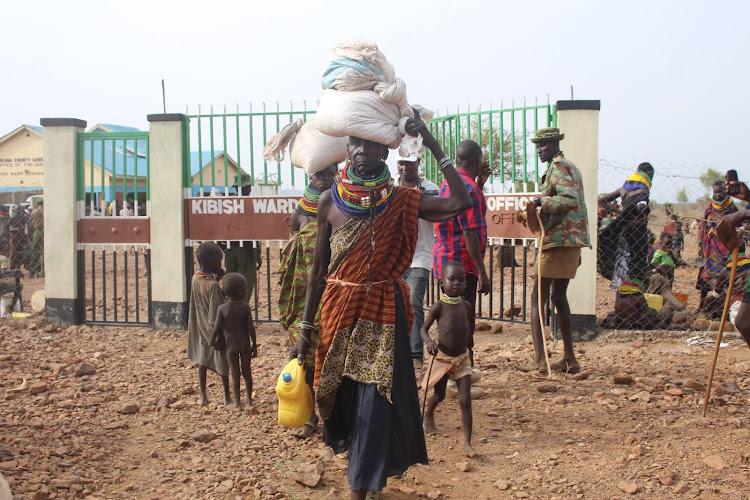Africa-Press – Eritrea. Women are most affected by the adverse effects of climate change compared to men, a UN report says.
Every day, hordes of women trek a dozen kilometres in search of water, food and firewood.
The conditions are exacerbated by droughts, floods and rising sea-levels.
This is according to a report by the UN titled ‘Dimensions and examples of the gender-differentiated impacts of climate change, the role of women as agents of change and opportunities for women.’
The UN Framework Convention on Climate Change prepared the report based on submissions from parties to the convention and observer organisations.
Also, a review of the Working Groups II and III to the Sixth Assessment Report of the Intergovernmental Panel on Climate Change.
Kenya, which is a party to the UNFCC Convention, also made submissions.
An increase in gender-based violence following climate-induced disasters was mentioned across the submissions.
The report says increased gender-based violence reduces the adaptive capacity and resilience of women and girls, weakening future communities’ resilience to climate change impacts.
“Notably, child marriage, which is considered an act of gender-based violence, has been observed in various communities in different countries and regions.
“The practice is seen in Bangladesh, Ethiopia and Kenya as an avenue to secure funds or assets and a coping mechanism in the event of a disaster,” it says.
The report further said all submissions noted that extreme weather events due to climate change disproportionately affect women and girls and their ability to perform their everyday tasks.
This it says, partly explains why some girls are forced to drop out of school.
“The tasks of collecting firewood and water in some countries, which traditionally fall to women and girls, are heavily affected by adverse climate change impacts.
“It forces women and girls to travel further from their homes to complete the tasks and provide for their families. The longer journeys increase their exposure to gender-based violence outside the home,” the report says.
It also highlights the interplay of gender and social norms resulting in women experiencing greater vulnerability to the impacts of climate change than men.
The report further emphasises the significant role that women and marginalised groups can play in mitigating and adapting to climate change.
It also discusses how providing opportunities for women and marginalised groups to participate in decision-making can contribute to the development and implementation of efficient and long-lasting climate-resilient policies.
The report provides examples of ongoing initiatives and projects and emphasises on the importance of continued efforts in this regard.
“All submissions indicated that a complex interaction of social factors puts women and marginalised groups at greater risk of experiencing the adverse effects of climate change over a prolonged period,” it says.
The report however says these adverse effects have varied social, financial and economic dimensions.
It says climate change affects groups differently as a result of the intersection of discrimination based on social factors such as urban or rural location, sexual orientation, educational background, income, gender, ethnicity, age, class and (dis) ability.
The report says all submissions noted progress has been made in gathering sex disaggregated data and systematically conducting gender analyses of climate policies.
However, more sex-disaggregated data are needed to better understand the gender-differentiated impacts of climate change in order to implement gender-responsive measures.
The role of women as agents of change and the need for more inclusive governance was highlighted in the submissions.
They said better integration of women and marginalised groups into decision-making at all levels would help to improve both mitigation and adaptation policies.
In particular, the submissions mentioned indigenous peoples, including indigenous women, as the custodians of traditional and indigenous knowledge, a key ingredient when designing climate-resilient policies.
The report says in order to preserve and apply traditional and indigenous knowledge, such groups must be empowered to share their knowledge through culturally respectful and inclusive approaches.
The submissions highlighted how adverse climate change impacts, especially extreme weather events, are affecting the roles of women and men around the world, particularly in rural areas.
“In some African countries, for example, rural-to-urban migration has been observed among men. A trend driven by extreme weather events, leaving the women behind in charge of land and the household.
“While such forced changes in living and working arrangements often cause hardship, they can also catalyse shifts in perception and gender roles. They build the capacity, improve the financial situation and promote economic empowerment of women and girls.”
Furthermore, there is need for gender mainstreaming in climate policy and action across sectors and at all levels, including through international instruments.
The report however says women’s and girls’ access to resources and opportunities to participate in decision-making are increasing due to the shifts in gender roles induced by climate change impacts.
It says women and girls however still face many barriers in accessing resources and participating fully in climate change decision making.
This is because women and girls do not always have the same access to education as their male counterparts.
This is due to traditional gender norms and may be aggravated by the impacts of climate change, for example if they result in girls being taken out of school or subjected to child marriage.
The report also says many submissions indicated that women tend to have more sustainable eating habits than men and plan more sustainably to guarantee food security within their household.
The report calls for women and girls empowerment and inclusive governance.
(Edited by Bilha Makokha)
For More News And Analysis About Eritrea Follow Africa-Press







